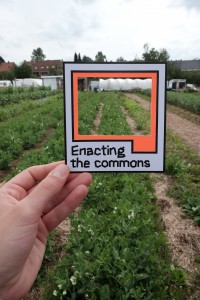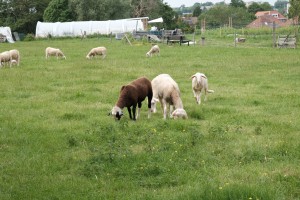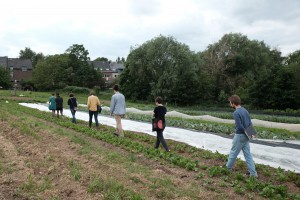La Ferme du Chant des Cailles is a sustainable food and participative urban farming project, born in 2012 in the heart of the Logis-Floréal garden cities in Watermael-Boitsfort in the Brussels agglomeration. It covers 3 hectares of building land, previously used for agricultural purposes. This land is made available by a social housing cooperative through a precarious lease which stipulates that the activities of the Farm must cease in the season if a construction project sees the light of day. This sword of Damocles on the project strongly influences its strategy of development and interconnection with the district. We visited the Farm while a research project on the complementarities between the agricultural and housing dimensions is still underway, and in the aftermath of regional elections which will bring about a possible renewal of the political choices relating to the project.
A project bringing ecological and social transformation, in symbiosis with its territory. Since its inception, the project has been thought out and carried out jointly by local residents and professional farmers (market gardeners, sheep breeders and producers of aromatic and medicinal plants). The different activities (professional activities of “community-supported agriculture” , but also community collective gardens and activities self-managed by and for the inhabitants of the neighborhood: parties, cooperative grocery, collective chicken coops …) have been grouped together since 2014 under the association “La Ferme du Chant des Cailles”. “The Chant des Cailles Cooperative”, which complements the ASBL, was created at the end of 2016 to consolidate the professional activities of the Chant des Cailles and raise the capital necessary to develop new projects. Today, it brings together 75 cooperators, who wished to invest in the production tool, and it is it that market gardeners and shepherds (self-employed) bill on the basis of a common hourly wage. La Ferme du Chant des Cailles does not only bring ecological transformation but also social transformation in a district whose history is marked by strong values of sharing (garden cities managed in a cooperative logic). However, these have gradually faded in favor of a more institutional and individualized approach to access to social housing, with a changing sociology (arrival of poorer inhabitants, immigrants, etc.). The project gradually acquired a very symbiotic dimension with its territory, each new activity enabling to reach new audiences.
Complex and evolving relationships over time with public actors. Interaction with public actors has taken and still takes multiple and complex forms, between power relations, negotiations and cooperation, the general position of the Farm reflecting that of several actors of the commons encountered during our trips: if the public actor must contribute to secure and perpetuate the project, in particular legally and in terms of infrastructure, it must not interfere in the management of the project and confiscate the citizens’ power to act and professionals involved in it. These relationships also vary according to the nature and interests of the different public actors concerned. It was with the Logis-Floréal social housing cooperative, which made the land available to the collective, that the oldest and most regular links were established. The need for dialogue and collaboration between the Farm and Logis-Floréal turned out to be all the stronger since the latter was far from imagining in 2012 the scale that the project was going to take. So the ASBL had to give it a place and reassure it that the project was open to all residents. It was under pressure from Logis-Floréal that the collective was forced (without really wanting to) to structure itself as an ASBL and to adopt common and written governance. The ASBL is today responsible for what is done on the ground and for the respect by each pole of activity of the agreement with the owner. Over the years, the Farm has also forged links with the Brussels-Capital Region (elected officials and cabinets in particular). This brings the program for the construction of 70 dwellings on the site relaunched in 2014 and put on hold in 2017 for 3 years, the time of the participative action research project SAULE (symbiosis urban agriculture housing environment), initiated by the Farm and funded by the regional organization for research and innovation Innoviris (therefore with funding from the Region). SAULE gathers around the Farm citizens, professionals of urban agriculture, researchers and urban planners to study the tensions, oppositions and solutions of articulation between the projects of agriculture and housing in urban environment, more particularly in Chant des Cailles. For the ASBL, this is an original means of influencing public decisions (“to offer tools to public operators to think of the city in a less compartmentalized way, with housing on the one hand and urban farming on the other ”), by activating the lever of research and social innovation. For the Government of the Brussels-Capital Region, it makes it possible to delay and perhaps avoid (for a time at least) going ahead in the face of a citizen and professional project that has gained momentum, notoriety and generated many positive impacts locally.
A project that acts as a citizen creativity laboratory for local administrations. It was the external pressure linked to the construction program that gradually led the project to pay increasing attention to social cohesion in the neighborhood, considered more important for the public actor as the feeder function of the Farm. For the non-profit organization, the strategy to “save the Farm” today consists of “making itself essential to the neighborhood”. This involves teaching users and cooperators to keep the site accessible and open to everyone, whether to take part in the project or to walk around and rest. The gates are never closed, the visits and educational workshops with schools in the neighborhood have multiplied, as well as the reception in professional centers of people with mental disabilities. In this logic of openness, the team of gardeners inhabitants obtained in 2014 a subsidy from the Municipality to develop a sustainable neighborhood pole and bring out the dynamics outside the plot: identify other spaces in the neighborhood to set up a collective garden, a compost or a neighborhood chicken coop, organize parties, in particular the Festival of 7 places, develop a cooperative grocery store which today has 400 members of the district… For the Municipality of Watermael-Boitsfort, in fact, the Farm today appears to be an exemplary experience and a laboratory for citizen creativity. It demonstrated to elected officials and the administration that it was possible for citizens to organize themselves, including in matters of governance (different activity poles, sovereign GAs, plenary meetings, etc.), and to carry out a project in autonomy. The land management, which manages certain collective gardens with a centralized registration system, is starting to wonder: how to create a more collective dynamic, with more inhabitants involved? The Municipality and the social housing cooperative are reviewing some of their practices in the light of the Chant des Cailles: management of green spaces (flower meadows, distribution of plants, etc.), citizen participation methods, etc. Collaborations have also been established with the Municipality in the area of circular economy (recovery of ground material on the site, etc.), on the initiative of the Farm. For Odile, alderman of Watermael-Boitsfort, active member of the Farm, the municipal budgets being very frozen. If the Municipality wants to implement more structured actions for the transition (repair cafes or resourceries for example), it is necessary to consider a new framework of alliance between municipal power and citizens (and possibly actors like the Logis Floréal), in which everyone can find a place and does not feel dispossessed. This is perhaps the last lesson of the project: joint management can also be a creator of political commitment. Three active members of the farm were elected in Watermael-Boitsfort in the municipal elections of 2018 … 


